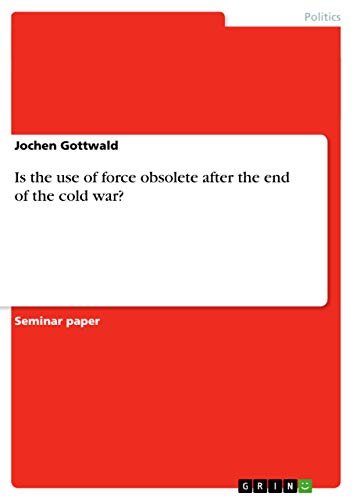Is the use of force obsolete after the end of the cold war? - Softcover

Zu dieser ISBN ist aktuell kein Angebot verfügbar.
Alle Exemplare der Ausgabe mit dieser ISBN anzeigen:„Über diesen Titel“ kann sich auf eine andere Ausgabe dieses Titels beziehen.
- VerlagGRIN Publishing
- Erscheinungsdatum2007
- ISBN 10 3638788490
- ISBN 13 9783638788496
- EinbandTapa blanda
- Auflage3
- Anzahl der Seiten36
Neu kaufen
Mehr zu diesem Angebot erfahren
Versand:
Gratis
Innerhalb der USA
Beste Suchergebnisse bei AbeBooks
Is the use of force obsolete after the end of the cold war?
Buchbeschreibung Zustand: New. Bestandsnummer des Verkäufers I-9783638788496
Weitere Informationen zu diesem Verkäufer | Verkäufer kontaktieren
Is the use of force obsolete after the end of the cold war?
Buchbeschreibung Taschenbuch. Zustand: Neu. This item is printed on demand - it takes 3-4 days longer - Neuware -Seminar paper from the year 2003 in the subject Politics - International Politics - Topic: Peace and Conflict Studies, Security, grade: 1.0 (A), National University of Singapore (Faculty of Arts and Social Sciences), course: International Security Issues, language: English, abstract: This essay will ask about the future role of force in international politics by challenging the widely acknowledged perception that the end of Cold War gave impact to an essential paradigm shift of International Relations. It aims to explain why the scholars of International Relations, as well as the actors of global politics, face a widening gap between an accelerated implementation of international institutions and an increasingly troubled world, hit by the violent outbreak of ethnic and national conflicts, the rise of global terrorism and a new cultural and religious conservatism. Today we are in the really paradox situation that the bipolarity of the Cold War - long perceived as the most frightening constellation of the international system - can be seen as its stabilizing factor. To find the origins of the resulting disillusion it is necessary to ask for the reasons that made the western actors in the 1990's believe that they succeeded. What made them believe that the end of Cold War meant the extermination of the use of force Did the end of the Cold War really impose a paradigm shift! Did it really change the nature of International Relations The thesis provided in this essay will be: no! It didn't! It has to be shown that Cold War only represented a common constellation of the international system, which can be often found throughout history; that the contemporary confusion exists because the paradigms of International Relations are based on a misinterpretation of Hobbes' state of nature; and that the use of force is the only continuous variable and therefore can be seen as a paradigm of international relations. This approach aims to lead the debate back to an actorcentered model of international relations, which tends to reduce force by a more flexible, constructivist interpretation of political leadership in the background of the actor's contemporary political and economic environment. 20 pp. Englisch. Bestandsnummer des Verkäufers 9783638788496
Weitere Informationen zu diesem Verkäufer | Verkäufer kontaktieren
Is the use of force obsolete after the end of the cold war?
Buchbeschreibung Taschenbuch. Zustand: Neu. Druck auf Anfrage Neuware - Printed after ordering - Seminar paper from the year 2003 in the subject Politics - International Politics - Topic: Peace and Conflict Studies, Security, grade: 1.0 (A), National University of Singapore (Faculty of Arts and Social Sciences), course: International Security Issues, language: English, abstract: This essay will ask about the future role of force in international politics by challenging the widely acknowledged perception that the end of Cold War gave impact to an essential paradigm shift of International Relations. It aims to explain why the scholars of International Relations, as well as the actors of global politics, face a widening gap between an accelerated implementation of international institutions and an increasingly troubled world, hit by the violent outbreak of ethnic and national conflicts, the rise of global terrorism and a new cultural and religious conservatism. Today we are in the really paradox situation that the bipolarity of the Cold War - long perceived as the most frightening constellation of the international system - can be seen as its stabilizing factor. To find the origins of the resulting disillusion it is necessary to ask for the reasons that made the western actors in the 1990's believe that they succeeded. What made them believe that the end of Cold War meant the extermination of the use of force Did the end of the Cold War really impose a paradigm shift! Did it really change the nature of International Relations The thesis provided in this essay will be: no! It didn't! It has to be shown that Cold War only represented a common constellation of the international system, which can be often found throughout history; that the contemporary confusion exists because the paradigms of International Relations are based on a misinterpretation of Hobbes' state of nature; and that the use of force is the only continuous variable and therefore can be seen as a paradigm of international relations. This approach aims to lead the debate back to an actorcentered model of international relations, which tends to reduce force by a more flexible, constructivist interpretation of political leadership in the background of the actor's contemporary political and economic environment. Bestandsnummer des Verkäufers 9783638788496
Weitere Informationen zu diesem Verkäufer | Verkäufer kontaktieren

